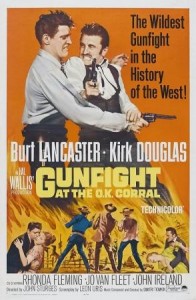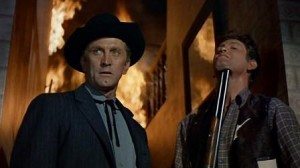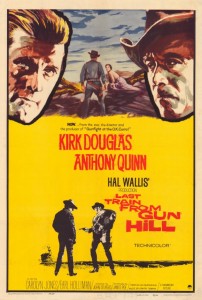“You’re leavin’ on the next train. I own the sheriff. I own this town. I own every man in it. You’re leavin’ on the next train, Matt.”— Craig Belden to his friend marshal Matt Morgan
Musing, as I often do, I’ve detected more than a few similarities between Last Train from Gun Hill, made in 1959, and Gunfight at the O.K. Corral, made two years earlier. The obvious resemblances are that both are Westerns—well, all right, sure—and both are directed by John Sturges, star [intlink id=”78″ type=”category”]Kirk Douglas[/intlink], scored by Dimitri Tiomkin, shot by cinematographer Charles Lang, produced (among others) by the always expert Hal B. Wallis and filmed in that great VistaVision process.
The parallels don’t end here. A crafty Sherlock Holmes—or anyone with access to the Internet!—will discover the overlapping of art directors (Hal Pereira and Walter Tyler), costume designer (Edith Head) and a partial sharing of set decorators and makeup artists. Further, Earl Holliman also stars in both, in each case ending up dead, and there are any number of minor supporting players who appear in both films, including Ethan Laidlaw, Walter Merrill, Frank Carter, Jack Kenny, Court Shepard, Henry Willis and, most notably perhaps, Glenn Strange.
Before I can tear myself away from this perhaps misguided obsession, there’s also a most similar plot twist and similar roles shared by two women characters. In Last Train from Gun Hill, the woman is Linda (Carolyn Jones), normally steadfast girlfriend of Craig Belden ([intlink id=”79″ type=”category”]Anthony Quinn[/intlink]), but who, having met marshal Matt Morgan (Douglas) on an inbound train to Gun Hill and gotten to know him, feels sympathetic and smuggles him a sawed-off shotgun.
Morgan is holed up in a hotel room with his prisoner, Craig’s son Rick (Holliman), who raped and murdered the marshal’s wife. Morgan must shoot his way out of the hotel, past Belden and twenty of his men and be on that last train out of Gun Hill at 9 p.m.—and with his prisoner. En route to the station, Rick is killed by “friendly fire,” as it would be called today, from his father’s men. The climactic gunfight is on the railroad platform between Morgan and Belden. Only Morgan makes the train, leaving Linda as Belden’s sole mourner.
 In Gunfight, the woman of interest is Kate (Jo Van Fleet), much-abused girlfriend—a polite euphemism for what she really is—of Doc Holiday (Douglas), who is also holed up in a hotel room, in this case because he is sick, dying of tuberculosis. Like Linda’s aid to Morgan, Kate has other allegiances, and, to spite Doc, whom she apparently loves, she takes up with Johnny Ringo (John Ireland).
In Gunfight, the woman of interest is Kate (Jo Van Fleet), much-abused girlfriend—a polite euphemism for what she really is—of Doc Holiday (Douglas), who is also holed up in a hotel room, in this case because he is sick, dying of tuberculosis. Like Linda’s aid to Morgan, Kate has other allegiances, and, to spite Doc, whom she apparently loves, she takes up with Johnny Ringo (John Ireland).
When Doc is at his sickest, he comes down from his hotel room to join marshal Wyatt Earp ([intlink id=”315″ type=”category”]Burt Lancaster[/intlink]) and two others in a showdown with the Clanton gang at the O.K. Corral. Although the gunfight is reputed to have lasted only thirty seconds, that doesn’t make for a good movie climax, so the shootout is quite extended—a lot of cat-and-mouse scrambling, rolling in the dust, gully crawling, shooting from behind obstacles, a wagon fire and on and on.
One actress who appears only in Gunfight deserves mention: Olive Carey; she starred in a few Westerns, i.e., The Searchers, The Alamo, Two Rode Together, Night Passage, and an even greater number of Western TV series. Look quickly in Gunfight, for her role as mother of the Clanton boys is brief.
 Both films are about friendship—the one that deteriorates between Morgan and Belden in Last Train from Gun Hill and the one that grows between Earp and Holiday in Gunfight.
Both films are about friendship—the one that deteriorates between Morgan and Belden in Last Train from Gun Hill and the one that grows between Earp and Holiday in Gunfight.
Dimitri Tiomkin’s music renders appropriate color and rhythm to both films. Like his contemporaries, including Erich Wolfgang Korngold and Max Steiner, Tiomkin uses a large orchestra, in his case one with much percussion. He has a fondness, and a knack for, songs, and uses them frequently in his Westerns—High Noon, The Alamo, Red River, Giant, etc.—though not in Last Train. Frankie Laine singing the title song in Gunfight adds a ballad-like narration to the film.
Related to song is the singability of Tiomkin’s melodies. And his penchant for catchy rhythms, especially suitable for Westerns, is manifest in those ringing taps on the tubular bells, the perky woodwinds and stretches of staccato syncopation—for trotting, cantering or galloping horses, for rocking stages and rolling carriages, for steaming locomotives, whatever the screen requires. Tiomkin, as always, matches the rhythm of the horses’ hooves with the music.
This was intended to be a discussion of Last Train from Gun Hill but ended up being a comparison between it and Gunfight at the O.K. Corral. Anyway, which is the better film? It’s hard to say, all considered. While Gunfight has somewhat better character development—it is the longer of the two films, so why not?—Last Train is a little tighter, fewer extended conversations, and the relationship between Linda and Morgan is a high point, developed to the right point. Some viewers might want their relationship expanded, but that would be detrimental to the integrity of the film, that comfortable pace already established.
In Gunfight, the romance between Earp and Laura (Rhonda Fleming) proves distracting—and more than a little predictable. Fleming, then thirty-four and never lovelier, plays a gambler who is jailed by Earp for breaking the law. The sympathy for her by both Holiday and Earp’s deputy (Holliman) eventually compels Earp to release her, and the love connection develops from there. But the romance is a distraction.
In either case, both films are better bets than most subsequent Westerns on similar themes—Lawrence Kasdan’s ponderous Wyatt Earp (1994) at well over three hours, or Clint Eastwood’s dark and bloody morality tale Unforgiven (1992). Admitted, there was a reasonably respectable remake of 3:10 to Yuma (1957) in 2007, with Russell Crowe and Christian Bale. The theme of the film is similar to Last Train—a lawman trying to take in a criminal, and, again, holed up in a hotel room until a train arrives.
Better yet in search for an ideal Western, and even superior to Last Train and Gunfight, there’s My Darling Clementine. The venerable John Ford’s poetic version of that O.K. Corral gunfight makes for a great movie, even if it is from 1946 and late in those “good old days.”
